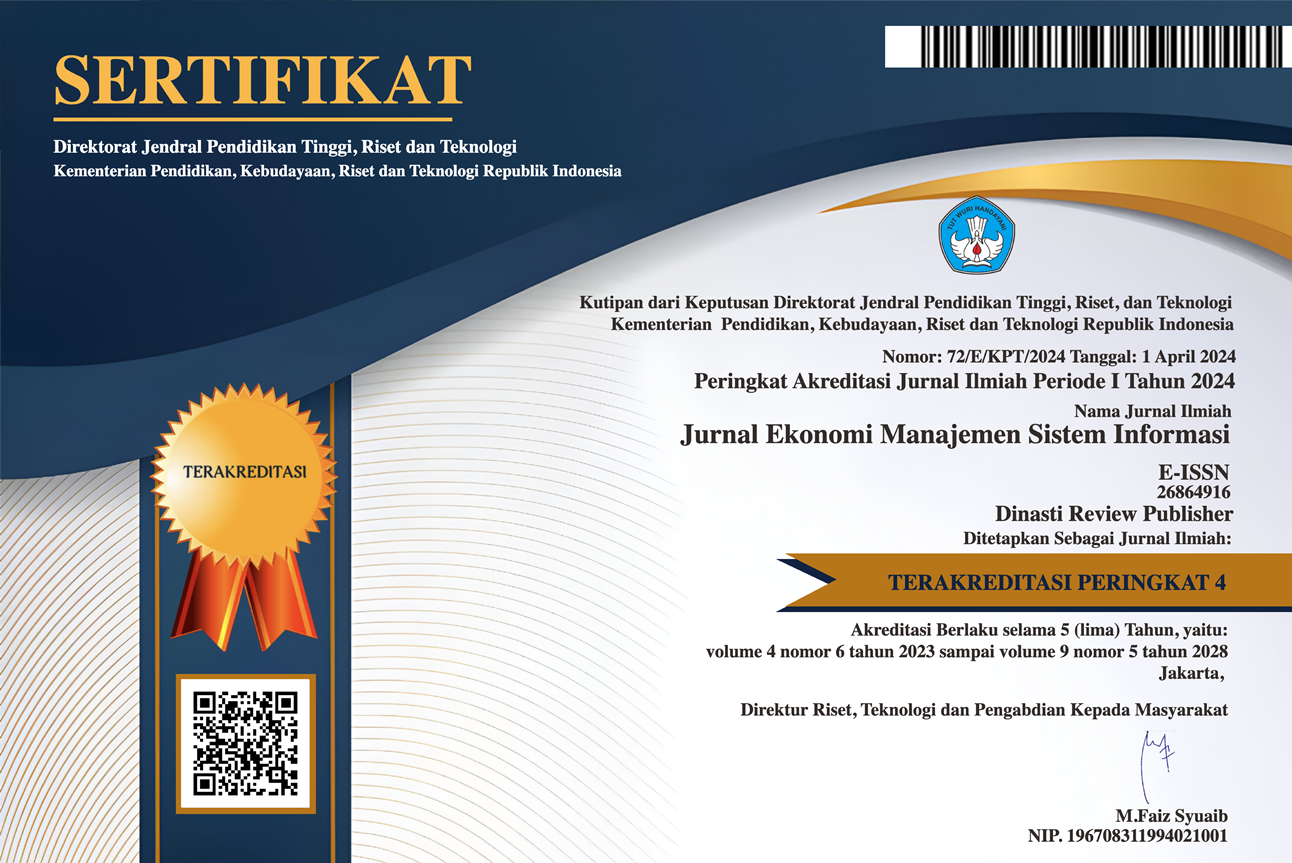A Systematic Literatur Review of Change Leadership: Mediation – Moderation Model
DOI:
https://doi.org/10.38035/jemsi.v6i4.4709Keywords:
Change Leadership, Anteseden, Konsekuensi, Mediasi, ModerasiAbstract
This study examines change leadership through a systematic literature review of 40 journals spanning the past 10 years, focusing on antecedent, consequence, mediating, and moderating variables in various organizational contexts. Antecedent variables include leader characteristics, organizational culture, and follower dynamics, which form the foundation for successful change leadership. The resulting consequences include positive impacts on individuals, such as increased job satisfaction, intrinsic motivation, and reduced stress, and organizational benefits, such as increased innovation, effectiveness, and change management. Mediating variables, such as work motivation and organizational trust, and moderating variables, such as organizational culture and resistance to change, play a significant role in influencing the relationship between change leadership and outcomes. The study also highlights that the health, education, and technology sectors are the main focus, with the geographical distribution reflecting both developed and developing country contexts. In conclusion, Change Leadership has a significant impact on the success of organizational transformation, with effectiveness influenced by various contextual, individual, and organizational variables, thus providing important insights for practitioners and academics in understanding the critical dimensions of change leadership.
References
Al-Haddad, S., & Kotnour, T. (2015). Integrating the organizational change literature: A model for successful change implementation. Journal of Change Management, 15(4), 245-268. https://doi.org/10.1080/14697017.2015.1061000
Amis J.M.; Janz B.D. (2020). Leading Change in Response to COVID-19. Journal of Applied Behavioral Science, 56(3), 272-278, https://doi.org/10.1177/0021886320936703.
Anderson, D., & Anderson, L. A. (2010). The change leader’s roadmap: How to navigate your organization’s transformation. Wiley.
Anderson, N., & Lee, H. (2018). Psychological safety and change leadership: Facilitating employee adaptation during organizational transitions. Journal of Organizational Behavior, 39(5), 743-760. https://doi.org/10.1002/job.2267
Armenakis, A. A., & Bedeian, A. G. (1999). Organizational change: A review of theory and research in the 1990s. Journal of Management, 25(3), 293-315. https://doi.org/10.1177/014920639902500303
Avolio, B. J., Bass, B. M., & Jung, D. I. (2009). Re-examining the components of transformational and transactional leadership using the Multifactor Leadership Questionnaire. The Journal of Occupational and Organizational Psychology, 82(4), 901-915. https://doi.org/10.1348/096317909X485885
Balogun, J., & Hailey, V. H. (2008). Exploring strategic change. Pearson Education.
Brown, R., & Green, M. (2021). Emotional intelligence as a mediator of effective change leadership in organizations. Organizational Psychology Review, 12(2), 134-155. https://doi.org/10.1177/2041386620982143
Dellve L.; Williamsson A. (2022). Development Work in Swedish Eldercare: Resources for Trustworthy, Integrated Managerial Work During the COVID-19 Pandemic. Frontiers in Public Health, 10, https://doi.org/10.3389/fpubh.2022.864272.
Denison, D. R., Haaland, S., & Goemaere, L. (2004). Corporate culture and organizational effectiveness: Is Asia different from the rest of the world?. Organizational Dynamics, 33(1), 98-109. https://doi.org/10.1016/j.orgdyn.2003.11.002
Hanafi I.; Bafadal I.; Timan A.; Supriyanto A.; Djamil S.M. (2023). Do Leadership Style and Work Culture Influence School Achievement? Journal of Higher Education Theory and Practice, 23(13), 212-222, https://doi.org/10.33423/jhetp.v23i13.6372.
Hughes, M., Ginnett, R. C., & Curphy, G. J. (2014). Leadership: Enhancing the lessons of experience (8th ed.). McGraw-Hill.
Jiang, H., & Proctor, C. (2019). The role of change leadership in digital transformation: Insights from IT professionals. International Journal of Project Management, 37(3), 423-435. https://doi.org/10.1016/j.ijproman.2018.10.005
Johnson, P., & Reed, K. (2020). Impact of psychological safety on leadership outcomes: A change perspective. Leadership Quarterly, 31(6), 101387. https://doi.org/10.1016/j.leaqua.2020.101387
Kim, S., & Park, E. (2019). The moderating role of organizational commitment in the relationship between change leadership and job satisfaction. Leadership & Organization Development Journal, 40(7), 861-874. https://doi.org/10.1108/LODJ-01-2019-0028
Kotter, J. P. (1996). Leading change. Harvard Business Review Press.
Levene F.; Higgs M. (2018). Leadership and Change Implementation in a Russian Context. Journal of General Management, 44(1), 5-16, https://doi.org/10.1177/0306307018780406.
Ling B.; Liu Z.; Chen D.; Sun L. (2021). Team Flexibility in Organizational Change Context: Antecedents and Consequences. Psychology Research and Behavior Management, 14, 1805-1821, https://doi.org/10.2147/PRBM.S332222.
Lukito D.; Suharnomo; Perdhana M.S. (2023). Investigating the Relationship of Change Leadership, Knowledge Acquisition, and Firm Performance in Digital Transformation Context. Quality - Access to Success, 24(194), 286-295, https://doi.org/10.47750/QAS/24.194.32.
Mamo Gebretsadik D. (2022). An Exploration of Change Leadership at Public Higher Education Institutions in Ethiopia. SAGE Open, 12(2), https://doi.org/10.1177/21582440221091256.
Martins, N., Kearney, C., & Smith, P. (2020). Organizational culture as a moderator of change leadership effectiveness. South African Journal of Industrial Psychology, 46(1), 1-12. https://doi.org/10.4102/sajip.v46i0.1812
Northouse, P. G. (2018). Leadership: Theory and practice (8th ed.). Sage Publications.
Okereka O.P.; Okolie U.C. (2024). Change Leadership and Employee Attitudes Towards Planned Organizational Change in Delta State Ministry of Education, Asaba, Nigeria. Public Administration Issues, (5), 130-145, https://doi.org/10.17323/1999-5431-2024-0-5-130-145.
Racaite-Samusiene V.; Saparniene D.; Jukneviciene V. (2021). Change Leadership at Local Self-government in the Context of COVID-19: The Case Study of Lithuanian Municipal Administration. Scientific Papers of the University of Pardubice, Series D: Faculty of Economics and Administration, 29(3), https://doi.org/10.46585/sp29031364.
Rixon A.; Judkins S.; Wilson S. (2024). Power and politics of leading change in emergency departments: A qualitative study of Australasian emergency physicians. EMA - Emergency Medicine Australasia, 36(3), 389-400, https://doi.org/10.1111/1742-6723.14363.
Smith, J., & Thomas, A. (2019). Exploring the mediating role of employee motivation in change leadership. Journal of Change Management, 19(3), 211-232. https://doi.org/10.1080/14697017.2019.1602150
Tarba, S. Y., Shenkar, O., & Li, J. (2022). Strategic change management in the digital era: An integrative approach. International Business Review, 31(1), 101758. https://doi.org/10.1016/j.ibusrev.2021.101758
Wong, Y. T., Lau, S. Y., & Lin, Z. (2021). Employee resilience and its moderating effects on change leadership outcomes. International Journal of Human Resource Management, 32(4), 912-933. https://doi.org/10.1080/09585192.2020.1789166
Downloads
Published
How to Cite
Issue
Section
License
Copyright (c) 2025 Sri Kurnia Abdi Pradhana, Muhammad Fakhruddin Mudzakkir

This work is licensed under a Creative Commons Attribution 4.0 International License.
Hak cipta :
Penulis yang mempublikasikan manuskripnya di jurnal ini menyetujui ketentuan berikut:
- Hak cipta pada setiap artikel adalah milik penulis.
- Penulis mengakui bahwa Jurnal Ekonomi Manajemen Sistem Informasi (JEMSI) berhak menjadi yang pertama menerbitkan dengan lisensi Creative Commons Attribution 4.0 International (Attribution 4.0 International CC BY 4.0) .
- Penulis dapat mengirimkan artikel secara terpisah, mengatur distribusi non-eksklusif manuskrip yang telah diterbitkan dalam jurnal ini ke versi lain (misalnya, dikirim ke repositori institusi penulis, publikasi ke dalam buku, dll.), dengan mengakui bahwa manuskrip telah diterbitkan pertama kali di Jurnal Ekonomi Manajemen Sistem Informasi (JEMSI).










































































